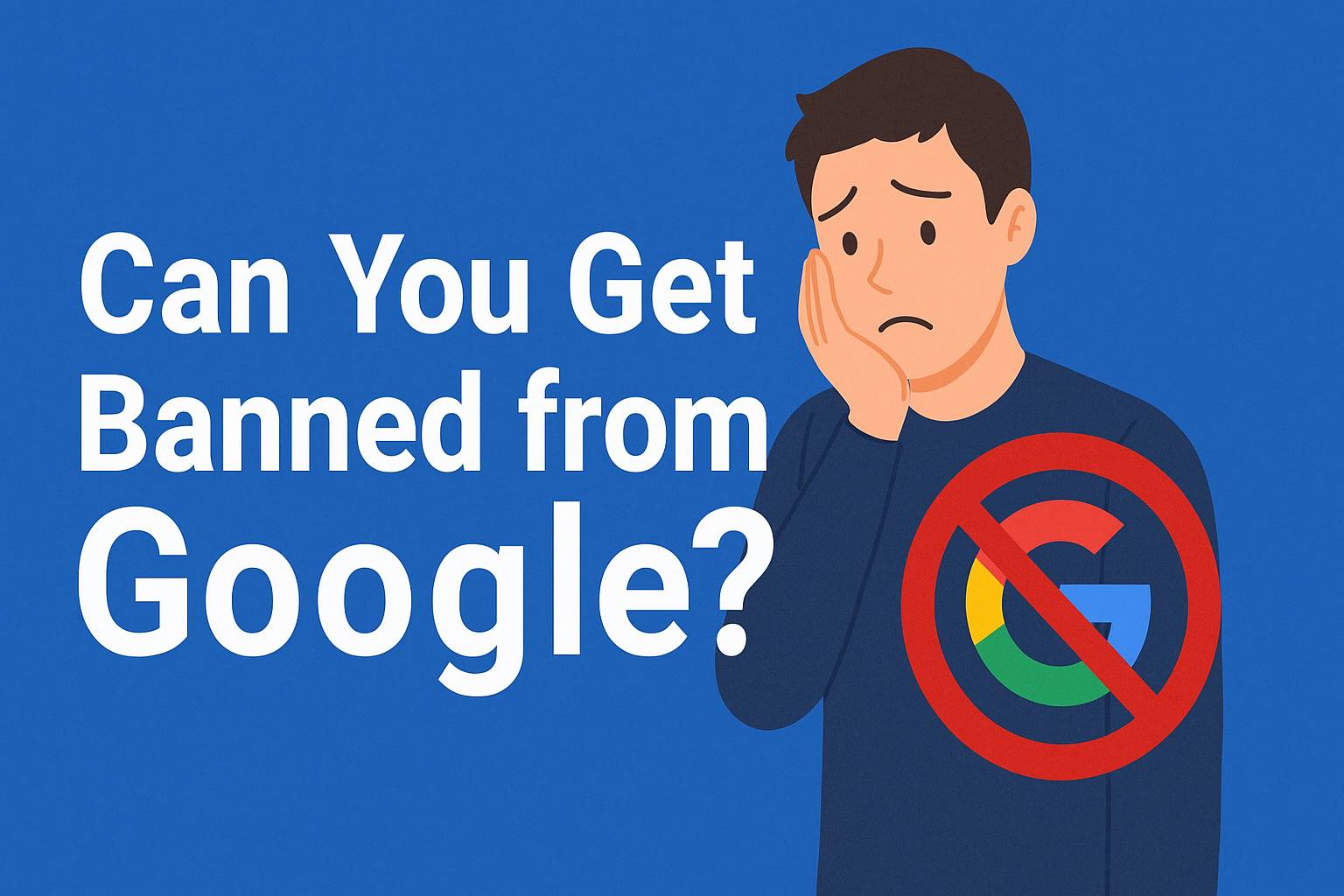Google is one of the most widely used platforms in the world, with billions of active users across its various services, including Google Search, Gmail, Google Chrome, YouTube, and more. But what happens if you step out of line? Can you get banned from Google? The answer is yes. Whether it’s your Google Account, Google Chrome, or even a website linked to Google’s search engine, you can indeed face penalties, restrictions, or outright bans. In this article, we will explore the reasons behind Google bans, how they happen, and most importantly, how to avoid them.
Understanding Google’s Banning Mechanisms
Google operates on a set of strict policies and guidelines designed to maintain a secure, safe, and useful experience for users. If a user violates these policies, Google may apply various penalties, including banning or suspending access to its services.
The reason for a ban can range from something as simple as spamming to engaging in activities that compromise Google’s integrity. For example, if your actions violate Google’s terms of service, your Google account or other related services can be suspended or permanently banned. Google’s banning mechanisms are often automated, leveraging algorithms to detect fraudulent or malicious behavior, such as spamming or distributing harmful content.
Can You Get Banned from Google Chrome?
Google Chrome, the world’s most popular browser, is also not immune to bans. While you might not get banned from using Google Chrome outright, certain behaviors and interactions within the browser could result in restrictions or penalties.
For instance, installing malicious extensions, engaging in behavior that violates Chrome’s terms of service, or using the browser for illegal activities can trigger a ban. This could involve being restricted from accessing specific websites or facing penalties for certain actions linked to your Chrome profile, such as spreading malware or engaging in phishing schemes.
If you are using Google Chrome to carry out black-hat SEO (manipulating search rankings) or violating Google’s guidelines on advertising, these actions could lead to account suspension or even being blacklisted in Google’s search results, effectively causing a “ban” from Google’s ecosystem.
Can You Get Banned from Google Account?
When it comes to Google services, the most common type of ban that users experience is a suspension or ban of their Google Account. A Google Account is the gateway to many of Google’s services, including Gmail, Google Drive, Google Photos, YouTube, and more. If you’re using your account to breach Google’s policies—whether by spamming, hacking, or violating content guidelines—it could lead to a suspension of your Google Account.
Violating Google’s policies on content sharing or conducting activities that go against their advertising terms can result in a temporary or permanent ban from Google services. Common reasons for a Google Account ban include:
- Spamming or excessive emailing: If you use Gmail to send unsolicited emails or engage in activities like phishing or malware distribution, your account is likely to get flagged and banned.
- Engaging in fraudulent behavior: Using your account for fraudulent activities such as identity theft, scam promotions, or breaking laws.
- Violation of YouTube’s policies: Posting content that violates YouTube’s terms, such as hate speech or adult content, can lead to account termination.
Google allows users to appeal a suspended account, but if the violation is severe, the ban may be permanent. It’s important to follow Google’s guidelines to avoid any risk of suspension.
The Google Banned List: What It Is and How It Affects You
The Google Banned List refers to a compilation of websites or services that have been blacklisted by Google. This typically happens when the website violates Google’s Webmaster Guidelines or engages in practices that harm user experience or the integrity of Google’s search results.
If a website gets on Google’s banned list, it will no longer appear in Google Search results. Websites that engage in activities like keyword stuffing, spamming, or link manipulation often find themselves banned. Google’s algorithm scans websites regularly, and any site found violating policies can be added to this list.
Being placed on the Google banned list can significantly harm a website’s visibility and traffic, which can severely impact business, advertising, and online marketing strategies. In some cases, websites can appeal their inclusion in the banned list and work to resolve issues, but getting removed can be a lengthy and complex process.
Common Reasons for Being Banned
So, what are the most common reasons why you might find yourself banned from Google’s ecosystem? Here are a few key factors:
- Violating Terms of Service: Whether it’s your Google Account or a website in Google’s search engine, any violation of Google’s terms can result in penalties.
- Black-Hat SEO Practices: Using unethical SEO techniques like keyword stuffing, link farms, or cloaking (showing different content to users and search engines) can lead to being banned from Google.
- Spamming: Sending unsolicited emails, engaging in fake reviews, or using Google services to distribute spam is a common reason for bans.
- Hosting Malicious Content: If your website contains harmful content, such as malware, phishing schemes, or illegal downloads, it can be flagged and banned.
- Misleading Ads: Running ads that deceive users, violate Google’s advertising policies, or manipulate results can result in a ban from Google services.
Case Studies of Google Bans
Let’s take a look at a few case studies of individuals and websites that faced Google bans:
- A Google AdWords Suspension: A business owner was running Google ads to promote their online store. However, the ads violated Google’s advertising policies by promoting counterfeit products. As a result, their Google Ads account was suspended, and they were temporarily banned from running future ads on the platform.
- A Website Banned for Black-Hat SEO: A website that engaged in aggressive link-building techniques to manipulate search rankings was banned from Google’s search engine. Despite the website owner’s appeal, the ban was upheld because the website was deemed to be in violation of Google’s Webmaster Guidelines.
These cases illustrate the severity of Google’s banning mechanisms and the importance of adhering to the company’s policies to avoid penalties.
How to Avoid Getting Banned from Google
Prevention is better than cure. Here are some key tips to help you avoid getting banned from Google services:
- Follow Google’s Terms of Service: Familiarize yourself with Google’s terms and adhere to them. This includes following policies related to content, ads, SEO practices, and more.
- Avoid Spammy Behavior: Never engage in spamming, phishing, or any other form of deceptive activity. If you are using Google Ads, ensure your ads are clear and transparent.
- Use Ethical SEO Practices: Stick to white-hat SEO techniques that comply with Google’s guidelines. Avoid using black-hat methods to artificially inflate search rankings.
- Ensure Your Website is Safe: Regularly check for malware or any harmful content on your site. Use tools like Google Search Console to monitor your site’s health.
- Provide Value to Users: Whether it’s content or services, ensure that your offerings genuinely benefit users and improve their experience online.
What to Do If You’re Banned
If you find yourself banned from Google, don’t panic. Here’s what you should do:
- Review the Violation: Check Google’s message or notice to understand why you were banned. If it’s related to your Google Account, you might have violated certain policies.
- Appeal the Ban: If you believe the ban was a mistake or that you’ve rectified the issue, file an appeal. Google allows users to request a review of their suspension or ban.
- Follow Up: If your ban is linked to a website, make sure to fix the violation. Google may require you to submit a reconsideration request after making necessary changes.
- Learn from the Experience: Moving forward, ensure that you comply with Google’s guidelines to avoid future penalties.
Conclusion
Being banned from Google, whether it’s from Google Chrome, your Google Account, or being placed on the Google Banned List, can be a serious consequence. However, by understanding the reasons for bans and taking proactive steps to comply with Google’s policies, you can safeguard your presence within its ecosystem. Always follow best practices for SEO, content sharing, and using Google services responsibly to avoid the risk of suspension or banishment.









Add comment
You must be logged in to post a comment.